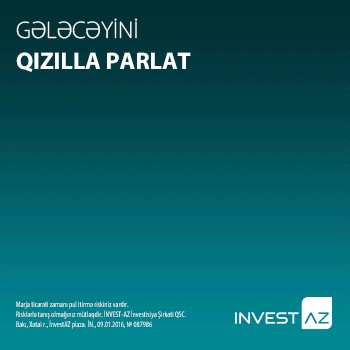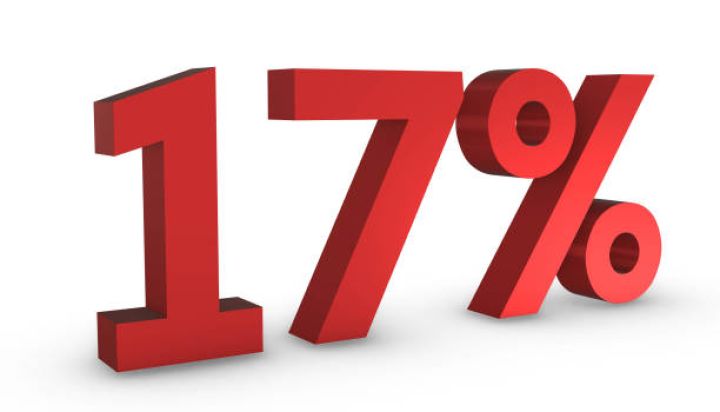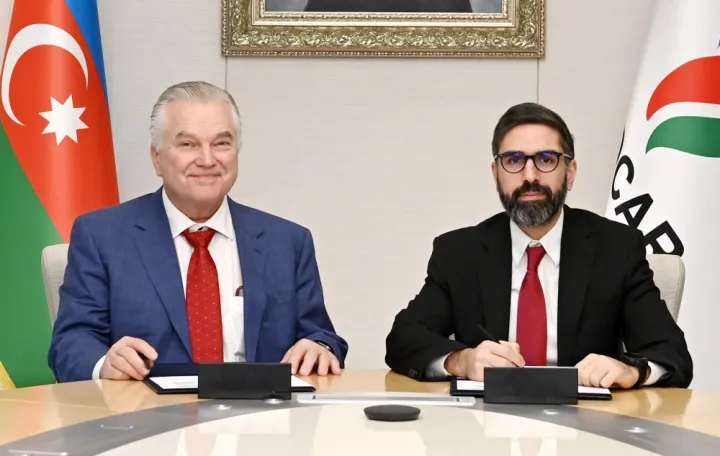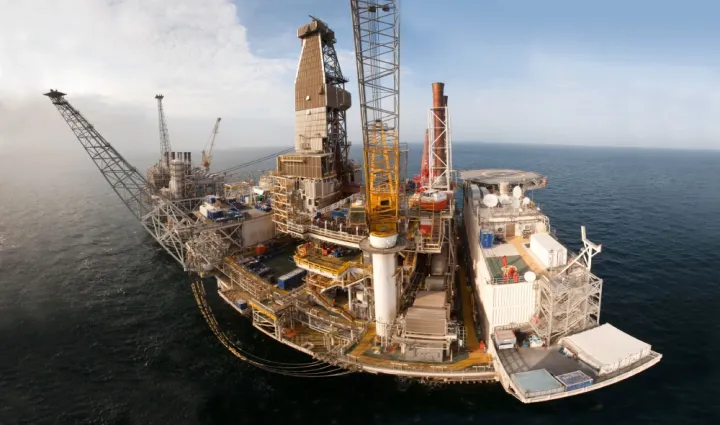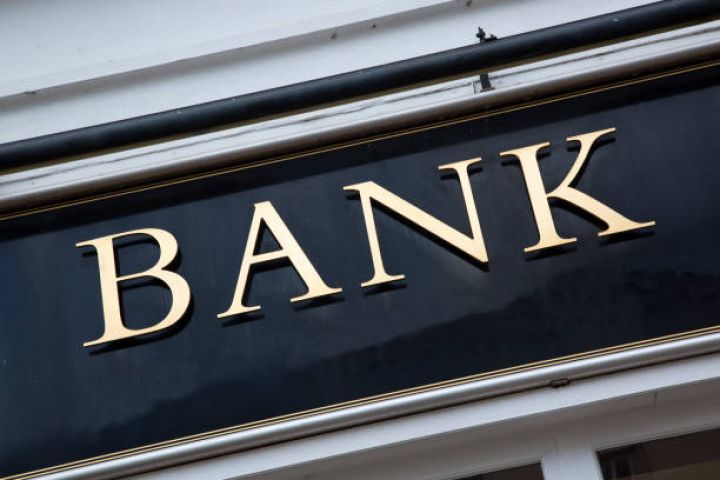Azərbaycanın müflisləşmə reytinqi təsdiqləndi - ZƏİF TƏRƏFLƏRİMİZ
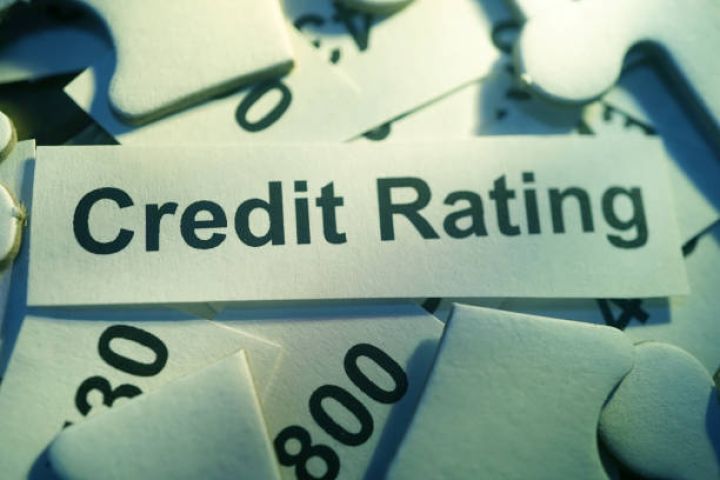
Qlobal kredit reytinqi təşkilatı "Fitch Ratings" Azərbaycanın xarici valyutada uzunmüddətli emitent defoltu reytinqini (IDR) "BB+" səviyyəsində, "müsbət" proqnozla təsdiqləyib.
Bu barədə Marja.az "Fitch Ratings"ə istinadən xəbər verir.
"Müsbət" proqnoz reytinqin yüksəldilməsi ehtimalının daha yüksək olduğu deməkdir.
"Fitch" qeyd edib ki, reytinq üçün müsbət amillər çox güclü xarici ticarət balansı, aşağı dövlət borcu və böyük suveren fond aktivlərindən maliyyələşmə çevikliyinin olmasıdır.
Reytinq üçün mənfi amillər isə zəif idarəetmə göstəriciləri, zəif iqtisadi siyasət çərçivəsi, yüksək maliyyə dollarlaşması, karbohidrogenlərdən böyük asılılıq və geosiyasi risklərdir.
Qeyd edilib ki, cari əməliyyatlar hesabının profisiti 2023-cü ildə azalsa da, lakin “BB” kateqoriyasında ən yüksək olaraq qalır: "Neft qiymətlərinin aşağı düşməsinə baxmayaraq (neft və qaz gəlirləri ümumi ixracın 90%-ni təşkil edir) 2024-2025-ci illərdə profisitlərin güclü qalacağını gözləyirik. Suveren valyuta aktivləri 2023-cü ildə 69,8 milyard ABŞ dollarına yüksəlib ki, bunun da 80%-i Azərbaycan Respublikasının Dövlət Neft Fonduna (ARDNF) məxsusdur. 2023-cü ildə ÜDM-in 67%-i səviyyəsində qiymətləndirilən Azərbaycanın xalis suveren aktivlərinin mövqeyi 2024-2025-ci illərdə sabit qalacaq ki, bu da Azərbaycan ilə eyni qrupda olan ölkələr arasında ən yüksək göstəricidir".
Məlumat üçün bildirək ki, "BB" kredit reytinqi korporasiya və ya hökumət kimi istiqraz emitentinin (istiqraz buraxaraq borc alan) kredit (borc) qaytarma qabiliyyətini və onun istiqrazları üzrə defolt (müflisləşmə) ehtimalını göstərmək üçün "Standard & Poor's" və "Fitch" kredit agentlikləri tərəfindən müəyyən edilmiş səviyyədir.
"Fitch" Zəif Siyasət Çərçivəsi yarımbaşlığı altında qeyd edib ki, Azərbaycan Respublikasının Mərkəzi Bankı (AMB) valyuta məzənnəsindən aralıq əməliyyat hədəfi kimi istifadə edir, valyuta bazarını və bank faizlərini yaxşılaşdırmaq üçün alətlər tətbiq edir. Pul siyasəti - inkişaf etməmiş kapital bazarları, həddindən artıq likvidlik, aşağı maliyyə vasitəçiliyi və hələ də nisbətən yüksək maliyyə dollarlaşması ilə məhdudlaşır.
"Fitch" hesab edirik ki, hakimiyyət orqanlarının ortamüddətli perspektivdə daha çox çevikliyə icazə vermək məqsədini bəyan etməsinə baxmayaraq, ABŞ dolları/Manat məzənnəsinin sabit saxlanması üçün hələ də güclü siyasi prioritet var.
İnflyasiyanın azalması: Azərbaycanda orta inflyasiya əsas ticarət tərəfdaşlarına nisbətən güclü manat və aşağı beynəlxalq ərzaq qiymətləri ilə 2023-cü ildə 9%-ə enib: "Fitch" inflyasiyanın 2024-cü ildə 4,5%-ə qədər azalacağını proqnozlaşdırır. İllik inflyasiya Azərbaycan Mərkəzi Bankının hədəf diapazonuna (4%±2) daxil olduğu üçün Mərkəzi Bank noyabr ayından etibarən əsas siyasət faizini 1,25 bənd azalaraq 7,75%-ə endirib. Fitch-in fikrincə, inflyasiyanın səviyyəsi daha da yumşaldılmanın tempi və miqyasından, yüksək əmtəə qiymətləri və tələb tərəfi təzyiqləri ilə bağlı risklərdən, məsələn, maaşların güclü artımı və dövlət xərclərinin icrasından asılı olacaq.
İqtisadi artımı: 2023-cü ildə artım nəzərəçarpacaq dərəcədə azalaraq 1,1%-ə kimi düşüb ki, bu da neft-qaz sektorunda azalmanı və bəzi əsas qeyri-neft sektorlarında, xüsusən də nəqliyyatda post-pandemiyadan sonrakı artımın zəifləməsini əks etdirir. "Fitch" Azərbaycanda iqtisadi artımın 2024-cü ildə 2,8%-ə, 2025-ci ildə isə 2,5%-ə qədər bərpasını gözləyir ki, bu da dövlət sərmayəsi ilə dəstəklənir. Eyni zamanda, yeni neft hasilatına görə enerji sektorunun geriləməsi azala bilər. İqtisadiyyatın şaxələndirilməsi istiqamətində irəliləyiş dövlətin böyük iştirakı, maliyyələşdirməyə məhdud çıxış, idarəetmə problemləri və enerjidən kənar xarici investisiyaların aşağı olması ilə məhdudlaşdırılır.
Münaqişə risklərinin azaldılması: Azərbaycan sentyabr ayında qısa hərbi əməliyyat vasitəsilə Qarabağa tam nəzarəti bərpa edib. Hazırda Ermənistan və Azərbaycan sülh sazişi üzrə birbaşa danışıqlara cəhd edirlər, lakin sərhədlərin delimitasiyası və demarkasiyası və Naxçıvana quru dəhlizinin tikintisi kimi mübahisəli məsələlər hələ də qalmaqdadır. Region ölkələri və Qərblə münasibətlər mürəkkəbdir, çoxşaxəlidir və qlobal geosiyasi proseslərin təsiri altındadır. Prezident İlham Əliyev fevralda keçirilən növbədənkənar prezident seçkilərində qalib gəlib.
"BB" nisbətən yüksək kredit riskini göstərir. Bu o deməkdir ki, borcalanın öz maliyyə öhdəliklərini yerinə yetirmək qabiliyyəti spekulyativ və ya “zibil” (junk) hesab olunur. "BB" "Moody's"in "Ba2" reytinqinə bərabərdir.
BB reytinqinin əsas xüsusiyyətləri
Daha aşağı kredit keyfiyyəti : "BB" reytinqli qiymətli kağızlar daha aşağı kredit keyfiyyətinə (borcun qaytarılması riski) malik borc qiymətli kağızları hesab olunur, bu da onların iqtisadi və ya maliyyə stressinə daha həssas ola biləcəyini bildirir.
Daha yüksək gəlir: "BB" səviyyəsində olan emitentin istiqrazlarına investisiya qoyan investorlar, artan defolt riskini kompensasiya etmək üçün ümumiyyətlə daha yüksək gəlir (faiz) tələb edirlər. Daha yüksək gəlirlilik "BB" dərəcəli qiymətli kağızlarla bağlı yüksək kredit riskini əks etdirir.
Qeyri-investisiya dərəcəsi : "BB" reytinqləri qeyri-investisiya dərəcəsi və ya spekulyativ reytinqlər hesab olunur, bu istiqrazların investisiya dərəcəli qiymətli kağızlarla müqayisədə daha yüksək defolt riski daşıdığını göstərir.
Daha aşağı likvidlik : "BB" reytinqli qiymətli kağızlar investisiya dərəcəli qiymətli kağızlardan daha aşağı likvidliyə malik ola bilər, çünki onlar bazarda o qədər də geniş satılmaya bilər.
BB, "BB+" "BB-": Fərqi nədir?
BB+ kredit reytinqi bu pillədə bir qədər aşağı kredit riskini göstərən "BB"dən yuxarı pillədir, "BB-" kredit reytinqi isə "BB"dən bir pillə aşağıdır və bir qədər yüksək kredit riskini göstərir.
XXX
Fitch Affirms Azerbaijan at 'BB+'; Outlook Positive
Fitch Ratings - London - 16 Feb 2024: Fitch Ratings has affirmed Azerbaijan's Long-Term Foreign-Currency Issuer Default Rating (IDR) at 'BB+' with a Positive Outlook.
A full list of rating actions is at the end of this rating action commentary.
KEY RATING DRIVERS
Positive Outlook: The rating is supported by a very strong external balance sheet, the lowest public debt in the peer group, and financing flexibility from large sovereign wealth fund assets. Set against these factors are weak governance indicators, a weak economic policy framework, high albeit declining financial dollarisation, heavy dependence on hydrocarbons, and geopolitical risks. The Positive Outlook reflects continued strengthening of external and fiscal buffers due to higher-than-budgeted energy prices, and prospects of greater expenditure restraint than in previous energy-sector windfalls.
Strengthening External Position: The current account surplus halved to 14.8% of GDP in 2023, but remains the highest in the 'BB' category. We expect surpluses to remain robust in 2024-2025 despite lower oil prices (oil and gas revenues account for 90% of total exports). Sovereign foreign-currency assets rose to USD69.8 billion in 2023, 80% of which are held by the Sovereign Wealth Fund of the Republic of Azerbaijan (SOFAZ), reflecting still-high energy revenues and record high returns on SOFAZ's investment portfolio. Azerbaijan's net sovereign asset position, estimated at 67% of GDP in 2023, will remain stable in 2024-2025, the highest in the peer group.
Fiscal Surpluses, Developing Fiscal Rule: Fitch expects higher-than-budgeted oil prices and non-oil revenue growth to underpin continued surpluses, despite increased reconstruction spending in Karabakh. We estimate the consolidated budget surplus rose to 7.8% of GDP in 2023. Azerbaijan has delayed by one year (to 2027) the targeted reduction in the non-energy primary deficit to 17.5% of non-oil GDP (from 25% in 2023) under its fiscal rule, to accommodate expenditure commitments related to Karabakh and defence.
The government also increased its public debt ceiling to 30% of GDP (previously 20%). Fitch considers that the rule has a limited record, and a weak institutional framework in terms of oversight and establishment of fiscal targets.
Government Debt Increase: Government debt rose to 21.8% of GDP in 2023 following the government taking over 8% of GDP domestic guaranteed debt from Agrarkredit. Fitch forecasts debt to average 21.6% of GDP in 2024-2025, the lowest in the 'BB' category. External government guarantees and on-lending declined to USD6 billion (8.2% of GDP) in 2023, with most of this related to the Southern Gas Corridor project, which is profitable and not likely to require sovereign support.
Weak Policy Framework: The Central Bank of the Republic of Azerbaijan (CBRA) uses the exchange rate as the intermediate operational target and has introduced instruments to improve transmission into the money market and banking rates. Monetary policy is constrained by underdeveloped capital markets, excess liquidity, low financial intermediation and still relatively high financial dollarisation. Moreover, lack of institutional independence and clarity of mandates for the CBRA and SOFAZ within the broader exchange-rate framework persist.
We consider there is still strong political prioritisation to maintain the de facto exchange rate peg to the US dollar, despite the authorities' stated aim of allowing greater flexibility in the medium term.
Inflation Declining: Average inflation declined to 9% in 2023 supported by a strong manat relative to Azerbaijan's main trading partners and lower international food prices. We project it will ease further to 4.5% in 2024, slightly above the 4% projected 'BB' median. As annual inflation entered the CBRA's target band (4%±2pp), the central bank has cut its main policy rate by 125bp to 7.75% since November. In Fitch's view, the pace and magnitude of further easing will depend on risks related to higher commodity prices and demand side pressures, for example, due to strong growth in wages and government spending execution.
Weak Trend Growth: Growth markedly decelerated to an estimated 1.1% in 2023, reflecting a contraction in the oil and gas sector, and easing of the post-pandemic boost in certain key non-oil sectors, most notably transport. We expect growth to recover to 2.8% in 2024 and 2.5% in 2025, supported by public investment, while the energy sector drag could ease due to new oil production coming onstream. Progress towards economic diversification is constrained by the large presence of the state, limited access to financing, governance challenges and low non-energy foreign investment.
Banking Fundamentals Steadily Improving: The banking sector has improved, but is still fairly weak, reflected by Fitch's Banking System Indicator score of 'b'. The overdue loans ratio decreased to a record low 1.8% at end-2023 (end-2022: 2.9%), underpinned by strong loan growth, loan recovery and write-offs. Capitalisation declined, but remains adequate, with the sector Tier 1 capital ratio at 13.5% at end-2023 (15.2% at end-2022). Profitability remained robust, supported by high asset yields and moderate funding costs due to the prevalence of current accounts in the deposit base.
Deposit dollarisation fell below 40% in 2023, approaching the historical peer median of 35%; foreign-currency loans fell to 19% of the sector loans at end-2023 (20% end-2022).
Reduced Conflict Risks: Azerbaijan re-took full control of Karabakh in September through a brief and decisive military operation. Armenia and Azerbaijan are currently seeking to directly negotiate a peace agreement, but contentious issues such as border delimitation and demarcation and the construction of a land corridor to Nakhichevan (through Southern Armenia) remain. Relations with countries in the region and the West are complex, multifaceted, and influenced by global geopolitical developments. President Ilham Aliyev won a new term in office in the February early presidential elections.
ESG - Governance: Azerbaijan has an ESG Relevance Score (RS) of '5' for both Political Stability and Rights and for the Rule of Law, Institutional and Regulatory Quality and Control of Corruption. Theses scores reflect the high weight that the World Bank Governance Indicators (WBGI) have in our proprietary Sovereign Rating Model. Azerbaijan has a low WBGI ranking at the 28 percentile reflecting very poor voice and accountability, relatively weak rights for participation in the political process, uneven application of the rule of law and a high level of corruption.
RATING SENSITIVITIES
Factors that Could, Individually or Collectively, Lead to Negative Rating Action/Downgrade
-Macro: Reduced confidence in the capacity of Azerbaijan's policy framework to preserve macroeconomic and financial stability in the event of external shocks, for example, oil price volatility.
-Public Finances: Significant deterioration in the strength of the public finances, for example, due to significant fiscal loosening.
-External Finances: Lower energy prices sufficient to have a material negative impact on external buffers.
Factors that Could, Individually or Collectively, Lead to Positive Rating Action/Upgrade
-Public Finances: Greater confidence that the strong public balance sheet will be preserved, for example, due to continued expenditure restraint or prolonged high energy prices.
-Macro: Greater confidence that improvements in the effectiveness and predictability of Azerbaijan's policy framework will help the economy manage external shocks and reduce macro volatility.
-External Finances: Further strengthening of the external balance sheet, for example, due to sustained high energy revenues.
SOVEREIGN RATING MODEL (SRM) AND QUALITATIVE OVERLAY (QO)
Fitch's proprietary SRM assigns Azerbaijan a score equivalent to a rating of 'BB' on the Long-Term Foreign-Currency (LT FC) IDR scale.
Fitch's sovereign rating committee adjusted the output from the SRM score to arrive at the final LT FC IDR by applying its QO, relative to SRM data and output, as follows:
- Macro: -1 notch, to reflect weaknesses in Azerbaijan's macro-framework, including lack of institutional independence and clarity of mandates for the CBRA and SOFAZ in terms of FX policy, significant constraints to monetary policy and a weak record of preserving the fiscal and external balance-sheet gains from previous energy windfalls.
- Public Finances: +1 notch added to reflect the sovereign's enhanced financing flexibility and public debt sustainability relative to 'BB' peers, derived from large SOFAZ assets, as well as the reduction of contingent liability risks derived from sovereign guarantees following the migration of a large portion of these into the sovereign balance sheet and SRM score.
- External Finances: +1 notch, to reflect large SOFAZ assets, which underpin Azerbaijan's exceptionally strong foreign-currency liquidity position and the country's very large net external creditor position.
Fitch's SRM is the agency's proprietary multiple regression rating model that employs 18 variables based on three-year centred averages, including one year of forecasts, to produce a score equivalent to a LT FC IDR. Fitch's QO is a forward-looking qualitative framework designed to allow for adjustment to the SRM output to assign the final rating, reflecting factors within our criteria that are not fully quantifiable and/or not fully reflected in the SRM.
COUNTRY CEILING
The Country Ceiling for Azerbaijan is 'BB+' in line with the LT FC IDR. This reflects no material constraints and incentives, relative to the IDR, against capital or exchange controls being imposed that would prevent or significantly impede the private sector from converting local currency into foreign currency and transferring the proceeds to non-resident creditors to service debt payments.
Fitch's Country Ceiling Model produced a starting point uplift of 1 notch above the IDR. Fitch's rating committee applied an offsetting - 1 notch qualitative adjustment to this, under the Near-Term Macro-Financial Stability Risks and Exchange-Rate Risks to reflect limited policy predictability, institutional independence and clarity of mandates for CBA and SOFAZ within the broader exchange rate framework, which increases the risk of a disruptive adjustment to a very severe shock. In 2016, authorities closed FX bureaus and attempted to introduce a FX transaction tax. There is still a strong political prioritisation to maintaining the 1.7 AZN/USD de facto exchange rate peg.
REFERENCES FOR SUBSTANTIALLY MATERIAL SOURCE CITED AS KEY DRIVER OF RATING
The principal sources of information used in the analysis are described in the Applicable Criteria.
ESG CONSIDERATIONS
Azerbaijan has an ESG Relevance Score of '5' for Political Stability and Rights as World Bank Governance Indicators have the highest weight in Fitch's SRM and are therefore highly relevant to the rating and a key rating driver with a high weight. As Azerbaijan has a percentile rank below 50 for the respective Governance Indicator, this has a negative impact on the credit profile.
Azerbaijan has an ESG Relevance Score of '5' for Rule of Law, Institutional & Regulatory Quality and Control of Corruption as World Bank Governance Indicators have the highest weight in Fitch's SRM and are therefore highly relevant to the rating and are a key rating driver with a high weight. As Azerbaijan has a percentile rank below 50 for the respective Governance Indicators, this has a negative impact on the credit profile.
Azerbaijan has an ESG Relevance Score of '4'for Human Rights and Political Freedoms as the Voice and Accountability pillar of the World Bank Governance Indicators is relevant to the rating and a rating driver. As Azerbaijan has a percentile rank beow 50 for the respective Governance Indicator, this has a negative impact on the credit profile.
Azerbaijan has an ESG Relevance Score of '4[+]' for Creditor Rights as willingness to service and repay debt is relevant to the rating and is a rating driver for Azerbaijan, as for all sovereigns. As Azerbaijan has track record of 20+ years without a restructuring of public debt and captured in our SRM variable, this has a positive impact on the credit profile.
The highest level of ESG credit relevance is a score of '3', unless otherwise disclosed in this section. A score of '3' means ESG issues are credit-neutral or have only a minimal credit impact on the entity, either due to their nature or the way in which they are being managed by the entity. Fitch's ESG Relevance Scores are not inputs in the rating process; they are an observation on the relevance and materiality of ESG factors in the rating decision.
Müştərilərin xəbərləri

“Qarabağdan Silikon Vadisinə” adlı yeni startap proqramı elan olunur - 50 MİN DOLLARADƏK DƏSTƏK VERİLƏCƏK

Kapital Bank-ın İdarə Heyətinə yeni təyinat - Bankın ödənişlər biznesinə və PashaPay-ə rəhbərlik edəcək
SON XƏBƏRLƏR
- 1 ay sonra
- 1 həftə sonra
-
10 saat əvvəl
17% gəlir təklif edən istiqrazlaırın yerləşdirilməsi üzrə hərrac tarixi açıqlandı
-
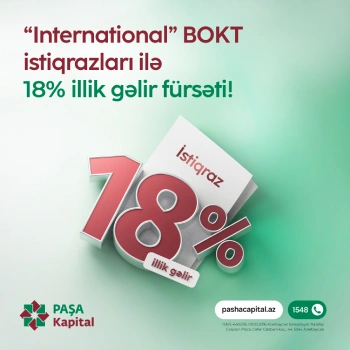
-
10 saat əvvəl
Azərbaycanın şirkətlər qrupu 92 yaşlı "qocanı" işə qəbul etdi
-
11 saat əvvəl
Avropa Komissiyası SOCAR-ın İtaliya şirkətinin səhmlərini almasını təsdiqləyib
- 11 saat əvvəl
- 11 saat əvvəl
-
11 saat əvvəl
"S&P Global Ratings" PAŞA Bank-ın proqnozunu “müsbət”ə yüksəltdi
- 11 saat əvvəl
- 11 saat əvvəl
-
12 saat əvvəl
Satışları kəskin azalıb - Nəhəng şirkət daha 100 mağaza bağlayacaq
-
12 saat əvvəl
Tarixin ən böyük birja çöküşü qapıdadır: “Hazırlıqlı olan daha da varlanacaq”
Son Xəbərlər

Azərbaycanda Vakansiyalar - Azvak.az
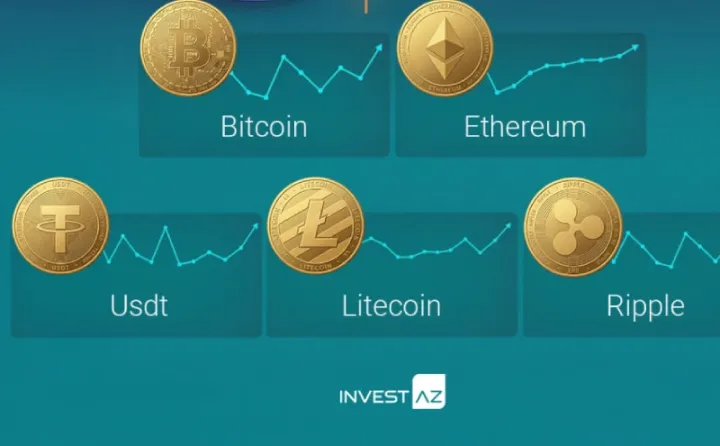
Kriptovalyuta ticarəti kursu

Azərbaycanın şirkətlər qrupu 92 yaşlı "qocanı" işə qəbul etdi

Bank kuryer xidməti üzrə tenderi elan edir
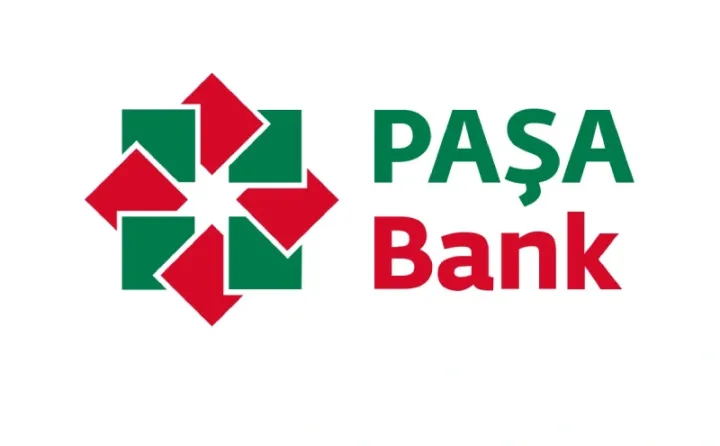
"S&P Global Ratings" PAŞA Bank-ın proqnozunu “müsbət”ə yüksəltdi

“Yelo Bank”a 2 yeni icraçı direktor təyin edilib
Ən çox oxunanlar

Birbank-ın Yığım hesabı ilə pulunuz hər gün gəlir gətirsin

Satışları kəskin azalıb - Nəhəng şirkət daha 100 mağaza bağlayacaq

Unibank sahibkarlar üçün mikro kredit kampaniyasını davam etdirir

Rusiya şirkətinə məxsus palma yağı Azərbaycanda satışa buraxılmadı, məhv edilməsi barədə qərar qəbul edildi

“Beneva” şirkətinin bioloji aktiv qida məhsulu tələblərə cavab vermədiyindən məhv edilib










